Dear Friends,
Today’s blog is a meditation about heirlooms. Have you one or more? Treasures from your parents or grandparents or a favorite aunt or uncle or friend? We can have them, but maybe we haven’t ever considered thinking about them in a prayerful way.
At the beginning of each summer, I take out of storage a crocheted bedspread my mother made between 60 and 70 years ago. Having been washed and folded away over the winter, the bedspread tends to be small, shrunken to barely cover the top of a queen-size bed. Within weeks of use, it stretches out to hang over the sides of the bed and nearly to the floor.
The ability to stretch is my first lesson from this heirloom. Physical therapists tell us that stretching helps keep our bodies healthy and supple. Creative teachers tell students to use their imaginations to stretch their thinking. The Holy Spirit inspires us to stretch our embrace of God, by recognizing life’s situations as God-moments instead of just everyday realities.
The picture above is a small portion of that bedspread. Threads have broken – no surprise after so many years. It’s time to go over the whole bedspread carefully and mend portions that need it. This is not the first or only year I have picked up needle and thread to mend the lace. It won’t look as neat as the original, but the stitches will hold the whole together, without more loss, more integrity at that one spot. Attentive stitching is necessary.
The need to mend an heirloom is a second lesson worth considering. Faith is an heirloom. So is the Church. Personally, and together, we have received faith and life in the Church from our ancestors. Parts of it have become unraveled, pulled apart. Maybe those parts were weak to begin with, and they need attention to restore wholeness. New threads can help. In our faith lives, what has given way? What needs a mender’s hand? Can we do the mending ourselves or is the work in need of a more skilled hand? Who do we know who can help? And even more basically, do we even want to restore it?
Finally, I am tempted not to use the bedspread – just keep it in storage. It could fall apart beyond mending. It’s a chance I wonder if I want to take. Should I just keep it as part of my past? I could glance at it every now and again when I am looking for something else. But treasured heirlooms, which are used, hold a greater measure of meaning than stored heirlooms. Use and mend. Use and mend. Use and mend. Visible. Touchable.
The third lesson from our heirlooms is to use them and mend them. Let faith and the Church, ever ancient, ever new, be out in the open, whatever that might mean. Add your own stitches. Mend it over and over again. Make it real for the next generation.
Take time this week to find and bring out into the open your personal heirlooms. Hold them and wonder “What do they say to me of faith and life?”
Bye for now. I’m off to mend my heirloom.
~ Sister Joan Sobala






